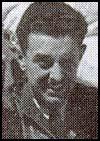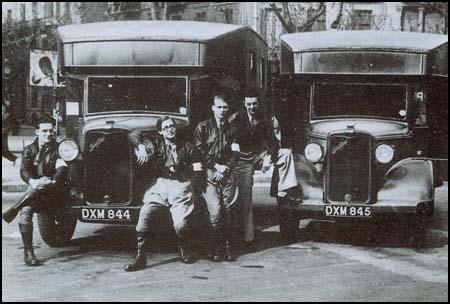Roy Poole

Roy Poole was born in Reading in 1911. After leaving school Poole became an active member of the Labour Party League of Youth. Other branch members included John Boulting, Josh Francis and Rosamund Powell. Poole, like most members of the LPLY, was to the left of the leadership of the Labour Party. This resulted in them having close contact with the Reading Branch of the Young Communist League, that included William Ball, Thora Silverthorne and Reginald Saxton.
On the outbreak of the Spanish Civil War it was decided to form a Spanish Medical Aid Committee. In his autobiography, All My Sins Remembered (1964), Peter Spencer, 2nd Viscount Churchill, explained what happened: "A group of us - three well-known medical men, a famous scientist, several trade unionists, and one communist - formed a committee for the purpose of collecting money for medical supplies to be sent to the Spanish Government forces."
On 22nd July 1936, Poole, Frank Wise and Reg Silverthorne were arrested in Reading for making an unauthorized collection for the Spanish Medical Aid Committee. On his release he decided to volunteer to be a ambulance driver for the SMAC. His friends, John Boulting, Rosamund Powell, Thora Silverthorne, Reginald Saxton, Josh Francis and William Ball also joined him in Spain.

The First British Hospital was established by Kenneth Sinclair Loutit at Grañén near Huesca on the Aragon front. Poole joined the group in January 1937. Other doctors, nurses and ambulance drivers at the hospital included Reginald Saxton, Alex Tudor-Hart, Archie Cochrane, Penny Phelps, Rosaleen Ross, Aileen Palmer, Peter Spencer, Patience Darton, Annie Murray, Julian Bell, John Boulting, Rosamund Powell, Richard Rees, Nan Green, Lillian Urmston, Thora Silverthorne and Agnes Hodgson.
Roy Poole told the Reading Chronicle: "It's jolly hard work of course. Often you don't get more than five hours to your night. We have had as many as 150 cases to handle in a day. I reckon that I alone have driven my ambulance over 11,000 miles on truly villainous roads - not bad going in about three months. Before we arrived on the scene the wounded had to be dragged down from the mountains on mules."
In an interview he gave to his local newspaper, Poole denied that the International Brigades had been involved in executing prisoners: " It is absurd and quite untrue to state that 15,000 were "lined up" and shot into trenches they had previously been made to dig. I have seen myself some hundreds of Italian prisoners taken by Government forces. They were being issued with cigarettes and food and not with spades to dig their own graves."
Roy Poole remained in Spain as an ambulance driver until 1938. On his return to Reading he married Rosamund Powell, who had worked for the Spanish Medical Aid Committee as an administrator in Barcelona.
Primary Sources
(1) Roy Poole, Reading Chronicle (5th January 1937)
It's jolly hard work of course. Often you don't get more than five hours to your night. We have had as many as 150 cases to handle in a day. I reckon that I alone have driven my ambulance over 11,000 miles on truly villainous roads - not bad going in about three months. Before we arrived on the scene the wounded had to be dragged down from the mountains on mules.
(2) Roy Poole, The Reading Citizen (April 1938)
It is absurd and quite untrue to state that 15,000 were "lined up" and shot into trenches they had previously been made to dig. I have seen myself some hundreds of Italian prisoners taken by Government forces. They were being issued with cigarettes and food and not with spades to dig their own graves.
(3) The Reading Standard (18 December, 1937)
There are at present three Reading people in Spain helping with ambulance units in Madrid (Thora Silverthorne, Reginald Saxton and Roy Poole), and by the time this is published they will probably have been joined at the front by another of their townsmen (John Boulting).
He is Archibald Frank Francis, a 24-year-old insurance inspector, who suddenly threw up his job a week ago in order to help the Spanish Government in their defence of Madrid. He took this step after three weeks of careful thought during which only a few friends knew of his intentions.
He came to his decision after reading appeals in various newspapers for food and clothing to be sent to distressed civilians in Madrid... and when last heard of he was half way across the continent to join the International Brigade.

